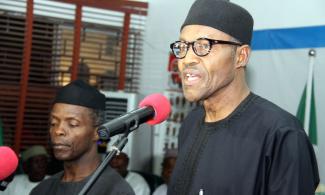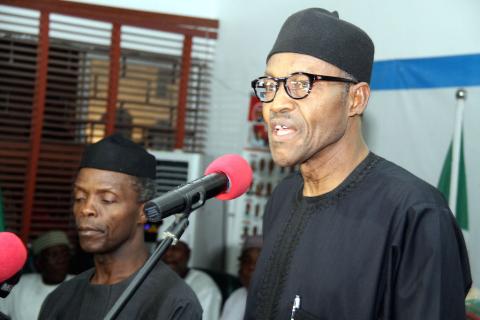
With the election victory over, President-Elect Buhari is now faced with the task of fulfilling his campaign promises and ridding the country of many of the vices that have brought her to her knees. In doing this, it is important that his team is not only competent and efficient, but that they also exude the values and ethos that the President-Elect is known for. Against this backdrop, it is worrisome to note the closeness of the erstwhile Chief of Army Staff, General AB Dambazau, to the President-Elect of Nigeria. General AB Dambazau, the Chief of Army Staff from 2008 - 2010, should ordinarily be a Nigerian whose neutrality, transparency and ability to positively transform an organisation should not be in question. When he was appointed the Chief of Army Staff, the army was at a crossroad and her officers and men were hopeful that he would transform the then ailing army and restore her to her glory days.

The emergence of General Muhammadu Buhari as the President-Elect of the Federal Republic of Nigeria, is a defining and triumphant moment in our history. It is a triumph in many ways for the Nigerian citizen, for he or she now knows that they can vote out a non-performing government. Conversely, every government from this moment on, is aware that it can be voted out if it fails to represent the interest of the people and provide quality, transparent leadership. A less apparent, albeit a personal, but equally important triumph, was General Muhammadu Buhari’s victory over a false and damaging perception of tribalism and religious bigotry leveled against him by political opponents. His victory over this perception is very significant, not only for the unfair dent that it created in his image and reputation of impeccable and devout service to his country, which he had honed over years, but also because it made him less acceptable amongst the very people who’s rights and liberties he defended, served, went to jail for, and sought to restore.
With the election victory over, President-Elect Buhari is now faced with the task of fulfilling his campaign promises and ridding the country of many of the vices that have brought her to her knees. In doing this, it is important that his team is not only competent and efficient, but that they also exude the values and ethos that the President-Elect is known for. Against this backdrop, it is worrisome to note the closeness of the erstwhile Chief of Army Staff, General AB Dambazau, to the President-Elect of Nigeria. General AB Dambazau, the Chief of Army Staff from 2008 - 2010, should ordinarily be a Nigerian whose neutrality, transparency and ability to positively transform an organisation should not be in question. When he was appointed the Chief of Army Staff, the army was at a crossroad and her officers and men were hopeful that he would transform the then ailing army and restore her to her glory days. This expectation was against the backdrop that he belonged to the Military Police Corps, which is responsible for maintaining discipline and regimentation in the army. It was also widely believed that being a Phd and academic would somehow impart positively on the army, in terms of development and operational efficiency. However, his two year stint as the Chief of Army Staff left the army degenerated, fragmented and precipitated dissent within the rank and file.
It was during his tenure as the army chief that wanton disregard for establishment, policies and traditions of the army became the norm. He ran a campaign of elevating the Hausa-Fulani over and above their peers in almost every facet of army life. The recruitment into the Nigerian Army Depot in Zaria became heavily lopsided as over half of the recruits were either Hausa-Fulani or Muslim recruits. This quickly sparked dissent along ethnic lines within the army as muslim/hausa officers and soldiers earned the wrath of their colleagues from other ethnicities; even those who never gained any favours from his actions. Professionally, it weakened the institution in such a way that it became normal for established rules and procedures to be disregarded on orders of the army chief.
Also during his regime, those who earned the right to be on the army merit list by their performances in army examinations and courses were denied the privilege to proceed on foreign training, in favor of officers who did not fall anywhere near the top of the merit list. The only criteria that such officers fulfilled was their closeness to the army chief and the fact that they came from the same place geographic area. Additionally, General Dambazau retired many officers without recourse to laid down procedures. Although some of them may have committed offences, they were retired in very wishy-washy circumstances. The retired officers all took the army to court, were found innocent, embarrassed the army and were eventually recalled to service.
During his stewardship of the army, the army became greatly divided along ethnic and religious lines. This adversely affected professionalism and eroded cohesion in the army. It was also a period where capital projects were carried out in very shady ways. One such example was the army hospital built during his regime and eventually probed by his successor. The then Director of Army Finance and Accounts was indicted and retired as a consequence of the fraudulence involved in the project. When General Dambazau left office in 2010, he had created enormous distrust and bitterness among the Hausa-Fulani/Muslim officers on the one hand, and officers from other ethnicities/Christianity on the other. The real consequence of his tenure as the army chief was felt when his successor assumed office, driven by the need to right General Dambazau’s wrong by acting in the same manner. Soon enough, cohesion, efficiency and discipline down-spiralled as the precedence he had set was taken to new heights.
Today the Nigerian Army is faced with a very factional leadership that disregards army procedures, laws and traditions in a very brazen way. This has brought the army’s ability to discharge her statutory role to an all time low, shaming her history and the nation in the eyes of the international community. Even more grave, the inability of the Nigerian Army to defend the citizens of this country has brought untold suffering and bloodletting such as we have never witnessed since the Nigerian Civil War. The sad thing is that General Abdurrahman Dambazau’s tenure as the Chief of Army Staff is used as a justification or basis to lead the army with such impunity. Such has become his legacy in the Nigerian Army.
In light of this, one can only imagine the horror and disappointment that has swept through the minds of service personnel as they observe the closeness between General Dambazau and the man many hope would bring a change to their ailing army and nation. After President-Elect Buhari’s 12 year triumphant fight over the false perception of favoritism, religious bigotry and tribalism, one of the greatest disservices that could befall him would be to bring in a person with a proven track record of these vices. Such a person would not only shatter the hopes of transparent leadership we have all looked forward to see in our President, but it would indeed bring his administration and what it stands for into disrepute. It our sincere hope that the President-Elect maintains a cordial relationship with General Dambazau and others who may have similar negative histories and reputations, but keep them at arms length as he embarks on this nation building effort with only those with the most pristine reputation, values and merit to bring to the task at hand.